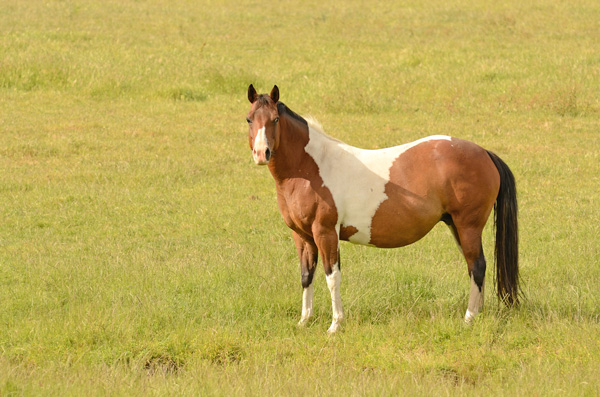
Monitoring vital signs on your horse is important for assessing that everything is going okay and recognizing when things are not normal. Knowing what is normal for your horse allows you to evaluate important clinical signs when your horse may not be acting or feeling well. (We discussed what you should look for in the previous article Normal Healthy Horse Parameters.) What’s the best way to gather this information? Taking the horse’s temperature, pulse and respiration rate. This is normally known as TPR. If you have any problems performing any of these tasks, talk to your veterinarian.
Remember, each person in your stable should know how to take TPR and record the results, as well as pass them along to the veterinarian over the phone. Take time to train your staff in these important steps.
Temperature
In horses you use a rectal thermometer (either digital or mercury) to take the animal’s temperature. It helps to attach a string to the thermometer with an alligator clip on the other end. This allows you to insert the thermometer for a reading and not worry about losing it either in or out of the horse’s rectum. The alligator clip is used to secure the string (and thus the thermometer) to the horse’s tail.
To take the horse’s temperature, first shake down the thermometer (if mercury) to make sure the reading starts at less than 96 degrees Fahrenheit. Then lubricate the thermometer with petroleum jelly or saliva and gently insert it into the rectum while holding the base of the tail out of the way. Be sure to stand to the side of the horse’s flank rather than directly behind in case the horse tries to kick while you insert the thermometer. Let the thermometer sit in the rectum for about two minutes (or until the beeper sounds with a digital thermometer), then remove and read the temperature.
A normal rectal temperature in and adult horse ranges from 98-101 degrees Fahrenheit for an adult. Normal can range up to 102 degrees Fahrenheit for a foal. That said, if a horse isn’t acting normal, even if the rectal temperature is normal, it might be advised to call your veterinarian. Not all serious problems are associated with an elevated rectal temperature.
Pulse (Heart Rate)
Although called pulse, this parameter is usually best obtained through a heart rate that is measured by using a stethoscope. The easiest place to access good heart sounds is on the left side of the horse along the body wall just behind the left elbow. Each “lub-dub” counts as one beat. Count the beats for 15 seconds and multiply by four. This gives you beats per minute or bpm.
Normal heart rate of a resting adult horse runs between 24-48 bpm. Each horse is different in this rate based on genetic capabilities. Also, a fitter horse will have a slower heart rate at rest. Young foals usually have higher heart rates, closer to 80 bpm when born and around 60 bpm in the early months.
Respiration
You can measure respiratory rate by watching movements of the diaphragm in the flank area, or you can hold your hand in front of the horse’s nostrils and measure the number of breaths of air over 15 seconds, then multiply this number by four to get respirations per minute.
Respiratory rates in normal resting horses range from eight to 20 respirations per minute. The rate is often higher when ambient temperatures are hot, especially with high humidity. Those environmental conditions require the horse to dissipate internal body heat, so respiratory rates might be higher than normal.
Knowing how to take TPR is important for anyone who owns or manages horses. Learn what normal is in general, and for each horse in your care. This will allow you to quickly assess if the horse has abnormal parameters and potentially avert a serious health problem by quick action.


